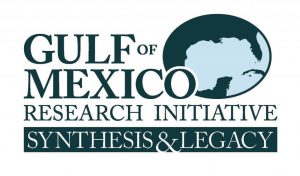Spring 2018 – GoMRI Synthesis & Legacy
– JUNE 19, 2018
 (From Spring 2018 Newsletter) The Gulf of Mexico Research Initiative (GoMRI) will come to an end in 2020 after 10 years of dedicated research efforts to understand the impacts of the Deepwater Horizon oil spill. The GoMRI Research Board has begun to consider GoMRI’s legacy and how to synthesize the program’s scientific discoveries and results. In the next two years, GoMRI will work to address key questions and synthesize GoMRI research, an effort called Synthesis and Legacy. Key questions that will be considered are:
(From Spring 2018 Newsletter) The Gulf of Mexico Research Initiative (GoMRI) will come to an end in 2020 after 10 years of dedicated research efforts to understand the impacts of the Deepwater Horizon oil spill. The GoMRI Research Board has begun to consider GoMRI’s legacy and how to synthesize the program’s scientific discoveries and results. In the next two years, GoMRI will work to address key questions and synthesize GoMRI research, an effort called Synthesis and Legacy. Key questions that will be considered are:
- What was the state of the science (“baseline”) before Deepwater Horizon?
- What have we learned?
- What major gaps in knowledge still exist?
- How can we best apply what we have learned?
- Where do we go from here?
The goal of GoMRI’s Synthesis and Legacy efforts will be to “document scientific achievements and advances, with the idea that synthesis will lead to new understanding.” The overall effort will include input from all members of the oil spill community, from the scientists to the responders and the user community. Synthesis and Legacy activities will be initiated both by the GoMRI Research Board and by the GoMRI-funded research consortia. To accomplish these objectives, core areas that align with GoMRI’s five research themes have been identified by the Research Board, as well as guiding principles to maintain consistency throughout the process. The core areas are:
- Plume and Circulation Observations and Modeling
- Fate of Oil and Weathering: Biological and Physical-Chemical Degradation
- Ecological/Ecosystem Impacts
- Human Health and Socioeconomic Impacts
- Ecosystem Services, Human Health, and Socioeconomic Impacts
- Microbiology, Metagenomics, and Bioinformatics
- Integrated/Linked Modeling System
Workshops will be held in each of the core areas. Each workshop’s focus and goals will differ depending on the topic area and based on the determinations of the workshop participants. However, each workshop will include approximately 25 to 30 participants and will consist of members of the GoMRI community and other researchers who have had research funded through the National Science Foundation Rapid Grants, the Natural Resource Damage Assessment, and other Deepwater Horizon-related funding. Where appropriate, the oil spill response community will also participate. The results of the workshops will be presented in open-access, peer- reviewed publications, ranging from single papers to special issues of journals. The workshops will begin in the fall of 2018 and continue throughout 2019.
Additionally, to ensure knowledge exchange with the user community, a working group has been established with members from the oil spill response community, non- governmental organizations, and the oil and gas industry. The working group will focus on lessons learned and operational advice for future spills.
In parallel to the synthesis efforts described above, the GoMRI-funded consortia will lead a diverse range of synthesis efforts. Combined with the synthesis workshop series and knowledge exchange working group, the totality of synthesis efforts will cement GoMRI’s scientific legacy and improve society’s ability to understand, respond to, and mitigate the impacts of petroleum pollution.
Updates on GoMRI’s Synthesis and Legacy efforts will be highlighted in future GoMRI Quarterly Newsletters. Follow along on the Synthesis and Legacy website here for more information and details as results emerge.






